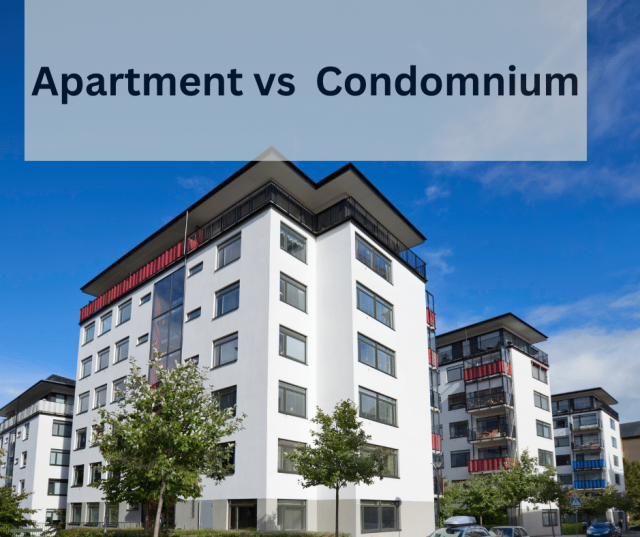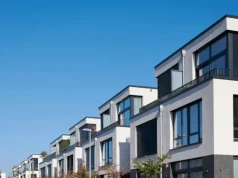Explain the difference between apartment vs condominium
Choosing the perfect place to call home is a thrilling yet complex journey. In real estate, deciding between an apartment and a condominium can be important in deciding on your ideal home. In this personalized guide by Propex, we’ll discover the multifaceted details, shedding light on the different aspects of apartments and condos.
By the end of this journey, you’ll be equipped with a deep understanding to make an informed decision about the property that aligns best with your lifestyle and preferences.
Understanding the Basic Difference
At first glance, apartments and condos might appear similar, nestled within shared buildings, but the core difference lies in ownership. Similar to well-behaved students, apartments are typically managed by a company or property management entity. On the flip side, condos exude a unique personality as they are owned by individuals, each contributing to the tapestry of the community.
A Homeowners Association (HOA) frequently acts as a guiding force, adding an extra layer to the condo living experience.
Also Read: What is HIG meaning in flats?
Understanding Ownership
The fundamental difference between apartments and condominiums lies in ownership. Property management companies typically own and manage apartments, offering a standardized leasing experience. On the other hand, condominiums, often referred to as condos, are privately owned residential properties that individual owners rent out.
Breaking Down the Aesthetics
Beyond the surface-level similarities, exploring the distinct vibes of apartments and condos reveals the differences that shape these living spaces.
Condo Vibes
Imagine a condo as a blank canvas waiting for the strokes of personal expression. Owners often leave their imprint with exquisite countertops, tasteful flooring, and sometimes luxurious amenities such as concierge services or a panoramic rooftop pool. The condo experience is synonymous with a VIP treatment that reflects the unique preferences of individual owners.
Apartment Vibes
Apartments, like reliable friends, maintain a consistent appearance. While they may lack the flamboyance of condos, they offer dependability and functionality. Basic amenities like laundry rooms and pools are part of the package, ensuring a comfortable and straightforward living experience.
Also Read: What is the meaning of BHK Full form?
Amenities: Tailored vs. Standardized
When it comes to amenities, the choice between an apartment and a condominium can significantly impact your living experience.
Condos offer a more personalized touch, allowing for unique features in each unit. Owners often invest in upgrades like granite countertops, hardwood flooring, and high-end appliances, creating a sense of exclusivity. Luxury amenities such as concierge services, garage parking, and pools are common in condo communities, adding a touch of luxury.
In contrast, apartments, while offering essential services and some amenities like laundry rooms, outdoor pools, and fitness centres, may lack the personalized touches found in condos. The units in apartment complexes are often identical, offering a standardized experience for all residents.
Renting Costs and Financial Considerations
Comparing the costs of renting an apartment versus a condo is crucial for effective financial planning. Rental prices for both options are generally comparable in the same neighbourhood.
Renting a Condo
While the cost may be slightly higher, encompassing HOA fees, the trade-off is a personalized touch and a well-maintained community. Condo fees associated with homeowners’ associations (HOA) can vary based on agreements with the owner. Transparent discussions about fees and what they cover are essential when considering a condo.
Renting an Apartment
Apartments offer simplicity in financial dealings. Rent payments are conveniently processed online, and while customization options are limited, the financial commitment is more manageable. The standard costs include the first/last month’s rent, a security deposit, and possible application fees.
Understanding all fees upfront allows for more accurate budgeting and prevents unexpected financial surprises.
Mastering the Maintenance
Maintenance is critical when weighing the pros and cons of apartment living versus condominium life.
Condo Maintenance
Maintaining a condo involves a choreographed dance between you and the owner. While the HOA takes care of shared spaces and community amenities, the responsibility for specific maintenance tasks within your unit lies with the landlord.
Apartment Maintenance
Apartments, equipped with a superhero-like maintenance team available round the clock, provide a hassle-free living experience. Residents can report issues online, and the maintenance team swiftly responds to address concerns, relieving tenants of the stress associated with home upkeep.
Rules and Regulations
Every community, like every playground, comes with its set of rules. Understanding how condos and apartments navigate these guidelines is essential.
Condo Rules
Living in a condo means adhering to the rules set by the HOA. From regulations about trash disposal to guidelines for pet ownership, condos offer a structured yet flexible living environment. It’s akin to a dance where residents follow a set rhythm while infusing personal flair into their living spaces.
Apartment Regulations
Apartments, too, come with a playbook crafted by property managers. The rules are designed to foster a harmonious living environment, from interior decorating guidelines to community conduct. The emphasis is on maintaining a balance between individual expression and community cohesion.
Who Is a Condo Best Suited For?
Condos present an enticing pathway to homeownership, making them particularly appealing for specific preferences and financial profiles.
Pros of Condo Living
Affordability Magnet
- Appeals to first-time homebuyers or those seeking to downsize.
- Median prices often align with the budgetary constraints of aspiring homeowners.
Low Maintenance Oasis
- Condo associations or HOAs often alleviate the burden of property maintenance.
- Ideal for those opposed to yard work or general upkeep.
Walkability Wonderland
- Many condo communities boast proximity to shopping, recreational areas, and public transportation.
- Ideal for individuals valuing urban convenience and accessibility.
Cons of Condo Living
Monthly Dues Dilemma
- Condo owners are usually obligated to pay monthly HOA fees.
- These fees can exhibit an upward trajectory, contingent on the amenities offered.
Privacy Predicaments
- Shared walls may compromise the sanctity of privacy.
- Limited control over noise levels compared to standalone homes.
Rule Adherence Reality
- While owning the condo, adherence to association rules is mandatory.
- Restrictions on property customization may be enforced.
Who Is an Apartment Best Suited For?
Apartments cater to a distinct set of needs, offering flexibility and convenience for those prioritizing mobility and cost-effectiveness.
Pros of Apartment Living
Flexibility Fortress
- Ideal for those not committed to long-term residence in a specific area.
- Renting provides flexibility for individuals who are frequently on the move.
Maintenance Ease
- Generally, landlords assume the mantle of property maintenance.
- Tenants are freed from substantial responsibilities, ensuring a hassle-free living experience.
Prime Locations Paradigm
- Apartment communities often thrive in or near city centres.
- Enjoy seamless access to restaurants, shopping, and entertainment hubs.
Cons of Apartment Living
Perks at a Premium
- While some apartments offer amenities, they might not match the extensive facilities of condo complexes.
Equity Elusion
- Renters do not accumulate equity over time.
- Absence of potential property value appreciation.
Noise and Privacy Niggles
- Proximity to neighbours can translate into noise-related challenges.
- Limited privacy compared to standalone homes.
Conclusion
If you value a personalized living space, unique amenities, and potential investment benefits, a condominium might fit you. On the other hand, if you seek a standardized living experience, convenience, and ease of renting without extensive financial commitments. An apartment might align more closely with your goals.
Consider factors such as ownership, maintenance, amenities, and associated costs carefully. Whether you choose the tailored luxury of a condominium or the standardized comfort of an apartment. Your decision should align seamlessly with your lifestyle, turning your real estate dreams into a reality.
Frequently Asked Questions
What is the main difference between an apartment and a condominium?
Who owns the property in an apartment vs. a condominium?
What are the differences in terms of maintenance responsibilities?
How does ownership differ between apartments and condominiums?
Are there differences in the level of privacy between apartments and condominiums?
What are the financial differences between renting an apartment and owning a condominium?
What are the differences in amenities between apartments and condominiums?
What is the process for making alterations or renovations in apartments vs. condominiums?





